‘Tough Kitchens’ and How to Challenge them
This is a guest piece written by Leo Niehorster. Leo (they/them) enjoys East and South East Asian cuisines and they love to eat at small, independent places!
Restaurant kitchens are not set up for people like me. While researching my next kitchen job and checking out the Instagram pages of all the famous fine dining restaurants I was excited about, I didn’t see one person who looked like me. In fact, they all looked very similar - they were all white men. I’ve always found it hard to imagine myself doing something until I saw people I related to doing it. Despite always enjoying cooking and searching for a profession where I could express my creativity, being a chef always felt off the table. I didn’t think it was an environment I belonged in due to the lack of representation and the stress/aggression that was portrayed on TV. I tentatively started cooking professionally at 31, getting a taste for it and gaining some confidence in the cafe at my local climbing gym. I was already 15 years behind and a different generation to everyone on my Professional Cooking Diploma when I started it last year.
I’m glad I didn’t grow up in this industry, when I was younger, vulnerable and impressionable. I would have internalised and accepted how this industry treats people. It turned out that when I progressed from the relaxed, protected environment of the climbing gym kitchen to an actual restaurant with awards, the culture was more like a Gordon Ramsey TV show than I'd feared. Toxic masculinity fuelled a culture of competitiveness, ego, toughness, overwork, and aggression. I've had a conversation with chefs who were proud of working 80 and 90 hour weeks, as if they deserved an award for martyring themselves. Because the working conditions are normalised, those who question it or struggle with it are seen as people who don’t belong in hospitality. They are seen as not caring enough or not being tough enough for this life. This is where being queer has granted me an advantage. I understand that queers live outside the system. We have always had to find our own ways of doing things in a way that works for us - we don’t accept the status quo. Just because things are normalised, does not mean we have to accept them and it doesn't mean they're right.
The kitchen reached 37.5 degrees the other day with the pot wash area a few degrees hotter. I really struggled, feeling exhausted and overwhelmed by the heat. I tried to talk to my colleagues who’d been working in kitchens most of their lives about how we can make the heat easier for ourselves and was told “that’s just how it is, you need to get on with it.” This narrative of toughness that has been created and encouraged by chefs feels like the sole tool at our disposal to survive the tough conditions of the kitchen. Anthony Bourdain is quoted as saying “There are two kinds of people in this world. There are people who like the relentless futility, heat, pressure, the madness, the insanity of restaurant kitchens. Then there's everybody else: normal people.” In some ways I understand this: some nights when we are really busy, it's really hot or something goes wrong, it feels like we’ve been to war and won. I’m pumped with adrenaline and feel like the strongest troops who've survived, victorious. But that creates an us-versus-them mentality, the chefs who have triumphed against the demands of the public.
One of the many problems with this culture of toughness is that only a very specific kind of person can survive it, which is why the culinary industry is still mostly made up of the aggressive, confident white men who created this culture. April Lily Partridge, sous chef of The Ledbury in London, is the second ever woman to win the Roux Scholarship and has recently won Chef to Watch at the National Restaurant Awards. In a recent interview she talked about experiencing anxiety and said “As a woman in this industry, I have to be strong… I have to put in that extra 10% or I will be walked over.” What if we didn't have to be strong or measure ourselves against this toughness? What if we could just be ourselves and still taken seriously and respected?
On the flip slide what if male dominated roles, such as Head Chefs, honed traditionally perceived feminine skills, like collaboration and teamwork with front of house staff and other chefs. Using good communication skills and the ability to regulate their emotions to “handle the heat”. Men typically aren’t taught how to look after themselves while not in work: self care is seen as “feminine” and men who look after themselves are sometimes made fun of, or even put in danger by men upholding toxic masculinity. They often turn to unhealthy coping mechanisms like alcohol to avoid their problems and end up bringing their stress back to work with them the next day.
It’s true, this job, as the industry currently is, is physically and mentally exhausting. That’s why I'd like to share some of the methods I’m using to try to live the life I want while working in this industry. This industry can be a place for all of us when we are empowered to show up as ourselves and find alternative ways to negotiate the demands of kitchen life. Read them in Part 2 here!
Liked this article by Leo? Follow them on instagram @queer.flavours.

